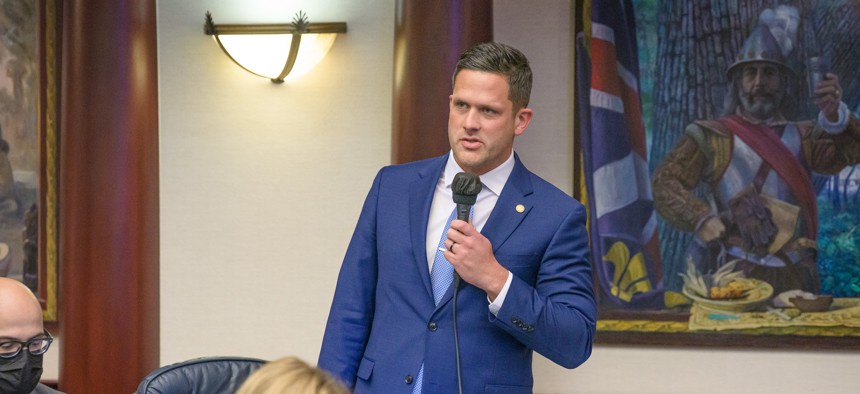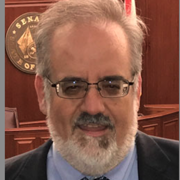Policy
Ex-state Rep. Joe Harding set to learn his fate from federal judge
Harding was indicted on fraud charges shortly after he won a second term without opposition in 2022.

Joe Harding in an undated photo on the House floor. Florida House Media
Federal prosecutors say former state Rep. Joe Harding betrayed the “public’s trust” and should be sent to prison.
But Harding’s employers and one of his brothers paint a picture of a hard-working family man who regrets fraudulently applying for business loans during the COVID-19 pandemic.
Now, U.S. District Judge Allen Winsor is poised to decide Harding’s punishment after the Ocala Republican pleaded guilty in March to charges of wire fraud, money laundering and making false statements.
Winsor will hold a sentencing hearing Thursday in Gainesville, with prosecutors saying in an August sentencing memorandum that Harding should go to prison after “bilking the federal government of $150,000.”
“Harding’s professional accomplishments and contributions to the community are commendable. However, the (sentencing) guidelines ‘authorize no special sentencing discounts on account of economic or social status,’” the Aug. 31 memorandum said, partially quoting a legal precedent. “Moreover, Harding’s intentional criminal acts while serving as an elected state representative signify a betrayal of the public’s trust.”
But Harding’s lawyers last week filed two letters that the ex-lawmaker’s employers and his brother, Samuel Harding, had sent to Winsor. While the letters didn’t explicitly address the potential sentence, they vouched for Harding, who works as an account manager at Del Zotto Products, an Ocala concrete-products company.
“We have watched Joe as a friend and employee navigate the challenges that he has faced this year,” six members of the Del Zotto family said in an Aug. 31 letter to Winsor. “Every person at some point in their life makes mistakes, and unfortunately for him, he has had to face his mistakes in an extremely public and brutal way. He is genuinely remorseful for the mistakes he has made, and he is very focused on the future.”
Meanwhile, Samuel Harding wrote a six-page letter June 11 that described Joe Harding as his “best friend.” The letter said Joe Harding has “addressed this issue head on with our family, individually, and with many of his friends and former business partners. Joe and I have sat and shared all the emotions possible over the impact his decision made to his young family of four, his wife and expansive extended family.”
“Your honor, you are interacting with Joe for a short and monumental amount of time,” Samuel Harding wrote to Winsor. “I assure you he has never dodged his responsibility. Joe has learned from this and is dealing with the dire consequences of his actions. I’m confident he will not re-offend. He has already illustrated full transparency.”
Harding resigned from the House after being indicted late last year. Patrick Parker Walsh, a brother-in-law of Harding, also pleaded guilty to wire fraud and money laundering related to pandemic relief and was sentenced in January to more than five years in prison, according to a Jan. 31 news release from the U.S. Attorney’s Office for the Northern District of Florida.
The Harding charges, in part, involved providing false information in December 2020 to the federal Small Business Administration to receive a $150,000 pandemic-relief loan in the name of The Vak Shack Inc., a company that did not have any business activity in 2019 or 2020, a March court document said. Harding also was accused of fraudulently seeking a loan for another business, though that loan was turned down.
“Although the pandemic-relief funds were intended for honest business owners — to whom these funds meant the difference between survival and financial ruin — Harding used them to pay his credit card balance and Shiloh Oil Company (owned by his brother-in-law, Patrick Walsh, who himself had committed extensive pandemic-related loan fraud),” the prosecutors’ Aug. 31 sentencing memorandum said.
Harding was first elected to the House in 2020 and drew national attention in 2022 when he sponsored a controversial measure that restricted instruction about sexual orientation and gender identity in schools. The bill was formally titled “Parental Rights in Education” by Republican backers but was disparagingly called the “don’t say gay” bill by detractors.
Harding was indicted shortly after he won a second term without opposition in 2022.
A sentencing memorandum filed Sept. 5 by Harding’s attorneys is not available on a court website. But a brief description on a docket indicated it includes a “motion for downward departure” from federal sentencing guidelines.
Guidelines provide a range of possible punishments, based on the crimes that were committed and other circumstances. The prosecutors’ Aug. 31 memorandum did not specify the guidelines in Harding’s case.
The prosecutors’ memorandum raised the possibility of varying from the guidelines but also said Harding should go to prison.
The memorandum said that “since getting caught, Harding has done almost everything that could be expected of a person who is facing federal felony charges. He promptly confessed to law enforcement and paid restitution to the SBA (Small Business Administration), and he further assisted law enforcement with their investigations.
“Although he declined to be charged by information (which would have saved resources associated with the grand jury), Harding entered a guilty plea soon after his arraignment, enabling the government and the court to allocate their resources efficiently. The government agrees that these facts could warrant a downward variance.”
This is a free News Service story for City & State readers. For more comprehensive and in-depth political and policy news, consider a subscription, beginning with a 10-day free trial. Click here to sign up!
NEXT STORY: Legislation filed in New York regulating minors’ social media use
